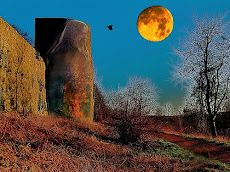
Tierra Sana Restaurant in Forest Hills, Queens, rocked with great writing last night.
For making it such a memorable night, I wish to extend my great gratitude to Vic and Stephanie Fiallo, the wonderfully gracious owners of Tierra Sana, to our MCs, Marron Cox and Foster Stevenson, and to our very talented and highly spirited writers, Emily Crocker, Roxanne Hoffman, Lawrence E. Soehnel, Leanna Renee Hieber, and Celia Farber.
Below are three past YouTube videos of our writers in action:
Leanna Renee Hieber
Roxanne Hoffman
Lawrence E. Soehnel
Our next event is April 6th.
Time: 7:00-9:00 pm (though you're welcome to stay until closing time!)
Free wine tasting! Free appetizers! Awesome ambience and food! A great collection of writers and their work!
Writers Scheduled to Read:
Janice Brabaw is the author of Universe, Disturbed, her first collection of poetry that draws directly from her teenage and college journals when she suffered from debilitating depression. She is also the author of And Again: A Memoir of a Life Disordered which chronicles her struggles with depression and borderline personality disorder. And Again is slated to be released in 2009 and Universe, Disturbed is currently in it's second edition. Brabaw lives in Williamsburg, Brooklyn. She runs the literary & musical series, Stained Glass Confessional in Brooklyn and has read at The Bowery Poetry Club, Otto's Shrunken Head, The Cake Shop, and the Library Lounge series at Telephone Bar. Her work has appeared in Poesis, The Toronto Quarterly, Ophelia Street, The Record, and The Cartier Street Review. Her website is: www.JaniceBrabaw.com
Alissa Heyman is a freelance writer and editor, as well as a Production Editor at Oxford University Press. She is the editor of THE BEST POEMS OF THE ENGLISH LANGUAGE (Mud Puddle Books), which includes brief biographies and annotations of poets and poems from Beowulf to T.S. Eliot. Her poems have been published or are forthcoming in Lyric and St. Petersburg Review. She is co-curator of The Graduate Poetry Reading Series at Cornelia Street Cafe. Heyman received her MFA in Poetry at Sarah Lawrence College where she was Managing Editor of Lumina magazine. She has also adapted and abridged a series of children's books, including THE BIG BOOK OF HORROR, THE BIG BOOK OF ADVENTURE, and THE BIG BOOK OF KNIGHTS, NOBLES, AND KNAVES (Sterling Publishing). She lives in Kew Gardens with her husband.
Michael Northrop's first young adult novel, GENTLEMEN, has just been published by Scholastic. He has written short fiction for the Notre Dame Review, The Adirondack Review, Weird Tales, and McSweeney's. He has been an associate editor at The World Almanac and a senior editor at Sports Illustrated Kids.
Amy Ouzoonian is the host of Uzi's Open every Thursday at Tribes Gallery in the Lower East Side. She is the author of Your Pill (poetry Foothills Publishing) and the editor of three anthologies of poetry, "In the Arms of Words", "Poems for Tsunami Relief", and "Skyscrapers, Taxis and Tampons." She lives and creates art in Queens.
Sarah Riley is a writer and filmmaker based in New York City. She performs live Visual Artistry as a collaborative force with various DIY Artists, using music, text, video, and human experience as mediums. Ms. Riley’s body of work includes five film shorts and various published writings. She has recently completed her first novella, Borderlands.
Mary Saliba is a poet and writer living in New York City. She graduated from NYU’s Tisch School of The Arts with her BFA, and later earned her MFA in creative writing from Emerson College. While at Emerson, she studied poetry with Bill Knott and wrote a book of poems for her thesis, entitled, “Please Steal Something Before You Go.” Her fiction and poetry have appeared in small press publications which mainly begin with the letters “A” and “B” because she has never managed to get farther than that in The Writer’s Market. Her short fiction was recently reprinted in the anthology, “Brevity and Echo,” and is used in the textbook “What If: Writing Exercises for Fiction Writers.” She has been a newspaper editor, reporter and features writer at many publications in New York and New Hampshire, and is currently working on a novel.
Taína is the Founder/Producer of The Latino Poets' Society Spoken Word Tour, a national spoken word tour consisting of an all Latino cast, a TV producer/Independent filmmaker, writer, photographer, and performing poet in NYC. She is a consummate artist with an observant eye, a passion for her culture and an undying drive to showcase the social ills of a lopsided society, Always on a quest to reach individuals in less than fortunate circumstances, she draws from her own experiences and never runs out of hope or inspiration. Through her work, she intends on changing people’s lives with one piece of art at a time.
Boris Zilberman grew up in New York City and graduated from Hunter College with a double degree in Creative Writing and Psychology. In addition to writing fiction and poetry, Boris performs stand-up comedy and improv when he's not working full time in internet marketing. It's also no secret that he loves an audience, though he isn't always sure what to do with one. He recently was one of the stars of "Monolgues," a spoken-word show directed by Def Poet Vanessa Hidary.
MCs: Foster Stevenson, Marron Cox
Location: Tierra Sana Restaurant
http://www.tierrasana.com/
100-17 Queens Blvd & 67th Road
Forest Hills, Queens
New York City
By subway, take the local R or V to 67th Avenue stop (and it's right there between 67th Road and 67th Avenue along Queens Boulevard).
All you need to bring is your love for the written word.
Best,
Mike










































